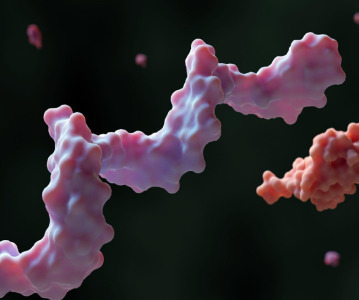Study paves the way for new autoimmune disease treatments with fewer side effects

New research has raised the possibility of minimising the side effects of treatment for patients with autoimmune diseases, such as multiple sclerosis and inflammatory bowel disease.
A research team has been using genetics to explore ways of producing new treatments for autoimmune diseases, but with significantly fewer side effects.
Many of the current treatments for autoimmune diseases, which include multiple sclerosis, rheumatoid arthritis and inflammatory bowel disease, involve deliberately weakening the body’s immune system. This leaves patients at greater risk of developing other opportunistic illnesses.
By studying ‘experiments of nature’ - naturally-occurring genetic variants that influence normal biological mechanisms - an Oxford-led team of scientists has been able to gauge the balance between efficacy and side effects.
The team has specifically investigated how genetic variation affects the function of a gene called TYK2. The TYK2 protein produced by this gene plays an important role in the processes that help the body fight off infection and cancer, but its activity can also promote autoimmune diseases.
The scientists found that a single genetic variant in TYK2 strongly protects against multiple different autoimmune diseases. This protective effect is mediated by a molecular change in the TYK2 protein that reduces its function and dampens down the activity of the immune cells, which could otherwise promote disease development.
The study, published in Science Translational Medicine, suggests that pharmaceutically mimicking the impact of the protective TYK2 variant could pave the way for new autoimmune disease treatments that balance the need for efficacy as well as safety.
Professor Lars Fugger of the Nuffield Department of Clinical Neurosciences, University of Oxford, who led the research, said: "Developing new drugs is a costly and time-consuming process. On average it costs over £1 billion and takes over 10 years to bring a new drug to market, and more than 90% of drugs that enter into clinical trials are not ultimately approved. This is because the majority of drugs fail to demonstrate sufficient efficacy to treat disease or they are associated with severe unwanted side effects.
"While our research indicates that TYK2 could be a good drug target for treating autoimmune diseases, drugs that block the activity of immune cells have been known to leave patients vulnerable to infections and to increase the risk of cancer.
"However, by interrogating data available through the UK Biobank, the most comprehensive health study in the UK, we found that people carrying the protective TYK2 genetic variant were no more likely to have serious infections or to develop cancer than people without the variant."
Related News
-
News Google-backed start-up raises US$600 million to support AI drug discovery and design
London-based Isomorphic Labs, an AI-driven drug design and development start-up backed by Google’s AI research lab DeepMind, has raised US$600 million in its first external funding round by Thrive Capital. The funding will provide further power t... -
News AstraZeneca to invest US$2.5 billion in Beijing R&D centre
Amid investigations of former AstraZeneca China head Leon Wang in 2024, AstraZeneca have outlined plans to establish its sixth global strategic R&D centre in China. Their aim is to further advance life sciences in China with major research and manufact... -
News Experimental drug for managing aortic valve stenosis shows promise
The new small molecule drug ataciguat is garnering attention for its potential to manage aortic valve stenosis, which may prevent the need for surgery and significantly improve patient experience. -
News How GLP-1 agonists are reshaping drug delivery innovations
GLP-1 agonist drug products like Ozempic, Wegovy, and Mounjaro have taken the healthcare industry by storm in recent years. Originally conceived as treatment for Type 2 diabetes, the weight-loss effects of these products have taken on unprecedented int... -
News A Day in the Life of a Start-Up Founder and CEO
At CPHI we work to support Start-Up companies in the pharmaceutical industry and recognise the expertise and innovative angles they bring to the field. Through our Start-Up Programme we have gotten to know some of these leaders, and in this Day in the ... -
News Biopharmaceutical manufacturing boost part of new UK government budget
In their national budget announced by the UK Labour Party, biopharmaceutical production and manufacturing are set to receive a significant boost in capital grants through the Life Sciences Innovative Manufacturing Fund (LSIMF). -
News CPHI Podcast Series: The power of proteins in antibody drug development
In the latest episode of the CPHI Podcast Series, Lucy Chard is joined by Thomas Cornell from Abzena to discuss protein engineering for drug design and development. -
News Amgen sues Samsung biologics unit over biosimilar for bone disease
Samsung Bioepis, the biologics unit of Samsung, has been issued a lawsuit brought forth by Amgen over proposed biosimilars of Amgen’s bone drugs Prolia and Xgeva.
Recently Visited
Position your company at the heart of the global Pharma industry with a CPHI Online membership
-
Your products and solutions visible to thousands of visitors within the largest Pharma marketplace
-
Generate high-quality, engaged leads for your business, all year round
-
Promote your business as the industry’s thought-leader by hosting your reports, brochures and videos within your profile
-
Your company’s profile boosted at all participating CPHI events
-
An easy-to-use platform with a detailed dashboard showing your leads and performance







.png)